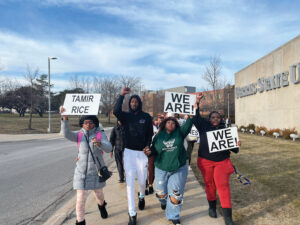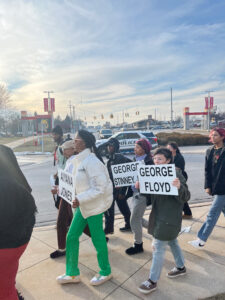
On Feb. 21, the sun shined as 50 people joined together to honor those who lost their lives to police brutality during the “We Are” silent march and presentation.
During the presentation, some of the speakers had a hard time getting through their speeches without getting emotional. Like the weather, the crowd was warm. They were understanding and advised the speakers to take their time.
Integrative studies senior Taylor Spidell was inspired to plan a march for Black History Month after the mother of Trayvon Martin, Sybrina Fulton, came to speak at Ferris.
“She was talking about how her son was killed, instead of by police brutality, it was by racial profiling, and it really touched my heart,” Spidell said. “I noticed that we didn’t have a march planned so, I was like ‘Oh yeah baby, we’re going to march.’”
Spidell intended to educate attendees and honor those who have died from police brutality, which she felt was done best by organizing a march that remained peaceful and silent.
“It’s a real thing to be afraid to walk outside my door just because of the color of my skin,” Spidell said. “This is something Black people have to live through on a day-to-day basis. If you’re not Black, you will never understand what it means or how it feels to be Black, but you can always try to take the time to understand and listen.”
People of different colors and races participated in the march. Spidell appreciated the number of attendees, but she also appreciated their differences and the allyship that radiated from the event.
“You know, there aren’t many people that look like me out here,” Spidell said. “So, to have representation and to have our allies means a lot to me, especially when it comes to things like this.”
Spidell advocates for her community by building a space for Black people at a predominately white institution like Ferris. By involving herself with campus events and organizations, she feels that she didn’t find her place, she made it.
“I have friends of all races, of all colors,” Spidell said. “But if I walk into the room and I’m always the only Black person, it’s going to make me feel like I don’t really belong here. I really had to create these spaces because they were [non-existent].”
Spidell chooses to be a voice for the Black community because she views it as a privilege.
“If I lived in another time, I would have been dead, in jail, or running for my life,” Spidell said. “People of my grandparents’ time sacrificed their lives just so I can do what I do peacefully. I feel like it would be disrespectful to be in the place that I’m at right now and not honor that.”
When Spidell brought the idea of this event to the Office of Multicultural Student Services, OMSS Director Michael Hopson told her to “run with it.” He feels that events like this show that it only takes one person to make an idea move from thought to fruition.
Hopson believes that Ferris allows students to voice their opinions and gives them a chance to educate others on topics they’re passionate about.
“I feel like our job as people here on campus is to try to make sure that diversity is intertwined and part of the fabric,” Hopson said.
A portion of the event was dedicated to presenting the names and stories of Black victims of police brutality. The speakers were careful with the names they chose to honor because of the time restraints of the event.
Psychology sophomore Iyonna Hester took to the podium before the march. She chose to talk about the story of Aiyana Jones, a seven-year-old girl who was fatally shot in the neck by the police in 2010.
“It just hit so close to home,” Hester said. “I was about five or six when I saw it on the news and I just remember being like ‘Oh, she has the same name as me, that could have been me.’”
She believes that Jones’ story sparked something in her that made her want to advocate for her community. Hester considers herself an activist because she feels like it was something she was meant to be.
“I’m a Black woman so it was automatically put onto me to speak up for those who can’t speak up for themselves and speak up for myself on top of that,” Hester said.
Hester feels that marches can be an effective form of activism because they encourage recognition of the cause, and because they are a starting point to change.
English and creative writing senior Massiel Calderon is a member of Gamma Phi Omega and an employee at the Hispanic/Latino Cultural Center. She believes that marches are a good form of peaceful protest.
After George Floyd was killed by a police officer, Calderon and her family were active in the New York City protests. She and her family participated in this march because creating awareness against police brutality is important to them.
“To be able to see small activism happening here in Michigan, which I believe is a little bit less socially developed, was very refreshing,” Calderon said.
Calderon is an activist because she believes it’s important to give a voice to those who aren’t here to defend themselves and for future generations.
“Being an ally to different groups is important,” Calderon said. “[Activism] has to be peaceful and inclusive. I know that there is a lot of racial division, but when we do activism, it’s important to do it together.”
For more events celebrating BHM, visit Ferris’ event calendar.

